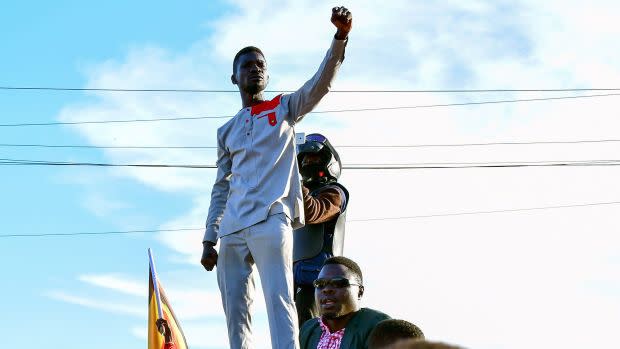Uganda wants Google to shut anti-government YouTube channels ahead of its election

Ugandan authorities are doubling down efforts to crack down on dissent ahead of the country’s Jan.14 polls.
In the latest incident, the Kampala regime has written to Google, which owns YouTube asking it to shut down 14 video channels, which the country’s media regulator says are linked to last month’s riots that left more than 50 people dead.
A review of the 14 accounts by Quartz Africa shows all have either streamed campaign content or host pundits sympathetic to opposition presidential candidate and musician Robert Kyagulanyi, popularly known as Bobi Wine. He is among 11 candidates challenging president Yoweri Museveni, who has been in power since 1986.
The 14 channels listed in the Dec.9 letter by the Uganda Communications Commission (UCC) to Google include Ghetto TV, KKTV, JB Muwonge, and Bobi Wine 2021 among others. While many of the channels have subscribers in the low tens of thousands, they collectively garner millions of views. As the election approaches many feature live coverage of Bobi Wine’s rallies which are often very popular with young Ugandans in urban areas.
In recent weeks the Museveni government has been clamping down on these opposition rallies often using the claims of Covid-19 restrictions being flouted to justify the pop star’s detention or the disruption of rallies by security officials.
The regulator says the channels violate Ugandan laws and threaten the country’s economy and national security. In linking them to last month’ deadly riots, UCC says the channels were used rally rioters through sensational and unbalanced reporting and commentary.
The tech giant has advised the Ugandan government to accompany their request with a court order according to several reports.
“Currently, we review government removal requests when notified through the correct legal processes and disclose these requests in our transparency report, in keeping with our stance on transparency,” says Dorothy Ooko, Google’s head of communications and public affairs for Africa in an emailed response. “In all cases, we would only restrict access to a video only after a thorough review to determine if the request meets both the letter and spirit of the law. Where content does not break local laws or violate our Community Guidelines, it will remain on the site.”
Local activists and analysts have long warned the Ugandan government is likely to shut down or restrict internet access and other telecom services like mobile money in the country in the days leading and after the elections. In 2016, the government shut down all popular social media platforms just before and after the general elections.
The request to Google, which the technology giant is unlikely to heed based on a review of the company’s policies, is believed to be preparing ground for action against vocal anti-regime internet users.
African governments have been increasingly heavy-handed in managing their political landscape in the wake of the impact of global social media platforms including Facebook, Twitter, and WhatsApp among others. The platforms are also facing rising pressure in Western countries led by the US and the UK to do more to curb so-called fake news, offensive, and racially insensitive content as regulators lean towards a reform agenda dealing with emergent issues around social media.
Uganda’s existing cyber laws have been used to crack down on anti-government activists in the country and have, largely, been effective. The government recently set up an Electronic Counter Measure Unit (ECMU) under the Uganda Police Force to detect and investigate crimes committed using online platforms including Facebook, YouTube, and WhatsApp.
But it has struggled in efforts to crackdown on diaspora dissenters abroad given the reluctance of global tech companies to aid such efforts. Threats and directives by the regulator to all bloggers who broadcast on any social media channel to register with the regulator have also been ignored.
Sign up to the Quartz Africa Weekly Brief here for news and analysis on African business, tech, and innovation in your inbox
Sign up for the Quartz Daily Brief, our free daily newsletter with the world’s most important and interesting news.
More stories from Quartz:
